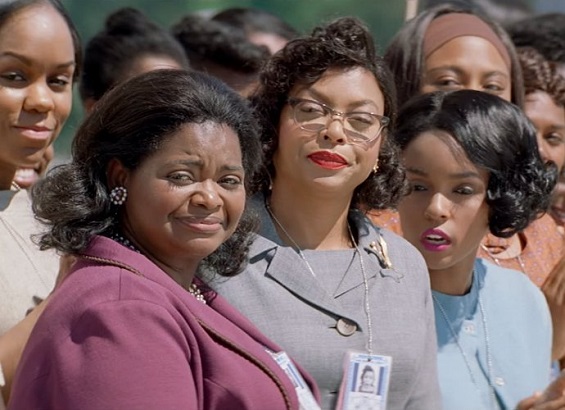
We tend to think of NASA as part of the “New Frontier” and “Camelot” and the general unembarrassed optimistic idealism we associate, accurately or not, with the late ‘50s and early ‘60s.
So it’s a slight jolt to realize that the space program, at least in its early days (then NACA, or the National Advisory Council on Aeronautics), was segregated.
It was, of course, decades before there were female or nonwhite astronauts, but in at least one facility, the Langley Research Center in Hampton, Virginia, the segregation was overt.
A pool of female African-American “computers”—the term was applied to humans who performed complicated mathematical functions in those days—was relegated to a separate building and separate restrooms on the Langley campus until at least 1958.
This drama focuses on Katherine Goble Johnson (Taraji P. Henson), who, among many other career achievements, calculated flight trajectories for John Glenn’s first orbital Mercury mission in 1962.
It also depicts Dorothy Vaughan (Octavia Spencer), the de facto supervisor of the department, and Mary Jackson (Janelle Monae), who became an aerospace engineer.
The director, St. Vincent’s Theodore Melfi, working from a script he wrote with Allison Schroeder (based, in turn, on Margot Lee Shetterley’s nonfiction book) seems to have compressed and conflated the chronology of events here for dramatic convenience, but he gets across the essentials of this remarkable story, another in the seemingly bottomless supply of belatedly-told instances of American achievement by women and minorities, in the face of outrageous intolerance.
The style is standard inspirational uplift, and the characterizations aren’t deep, but the cast—the three leads and also Kevin Costner as the Langley big boss—are vibrant enough to fill in the blanks.
The bright primary-color cinematography and the midcentury period detail are parts of what make this cinematically inconsequential movie so pleasant. Another part, I confess, is the glamour of the lead actresses—I know we’re supposed to be celebrating their intellectual and social triumphs, but as they scurry around in their pencil skirts and glasses, they also show a lot of nerd chic.
Time for that annual list of the movies that, at this moment, seem like my 10 favorites of the year…
Moonlight — This naturalistic coming-of-age story from director Barry Jenkins about an African-American kid in Miami’s Liberty City and his subsumed sexual identity, among other struggles, inspires a litany of adjectives: Heartbreaking, harrowing, tender, beautiful, thoroughly original. Too violent and too frank for younger kids, but a knockout.
Manchester by the Sea — There’s an unbearable tragedy at the center of this New England drama, but as usual writer-director Kenneth Lonergan seems incapable of hitting a false note, the long-underrated Casey Affleck is superb in the lead, and Michelle Williams is unforgettable in her big scene.
Florence Foster Jenkins — Heaping praise on Meryl Streep started getting old two decades ago, but when she keeps offering up beguilingly silly work like this portrait of the Manhattan wannabe soprano, what else can you do? Hugh Grant is also at his best in this, as are supporting player Simon Helberg and director Stephen Frears.
The Eagle Huntress — Whether or not it strictly qualifies as a documentary, Otto Bell’s chronicle, full of engaging non-actors using their real names, of a Mongolian Kazakh teenage girl breaking into the traditionally male field of eagle hunting is one-of-a-kind and exhilarating.
Paterson—Jim Jarmusch’s New Jersey idyll, about a week in the life of a bus driver and contentedly unknown poet, is suspiciously rose-colored in its view of the heartsease of an artist with a working life. But it’s such a serene fantasy, and Adam Driver is so sweet in the lead, that you’re likely to be drawn in.
Hell or High Water—This tight, grimly funny Texas noir features maybe the best use of the “cop about to retire” cliché ever. The four leads are outstanding: Chris Pine as a desperate small-potatoes bank robber, Ben Foster as his cheerfully nihilistic brother and partner, and Jeff Bridges and Gil Birmingham as the Texas Rangers hunting them.
Loving—A hushed, restrained, moving portrait of the people behind 1967’s famous Loving v. Virginia Supreme Court decision, which declared interracial marriage a constitutional right. Joel Edgerton and Ruth Negga are quietly superb in the leads.
Dr. Strange—Of this year’s big-studio blockbusters, this origin story for Marvel’s cheeky metaphysician may have been the most enjoyable. Benedict Cumberbatch is just right in the title role, Tilda Swinton is a delight as The Ancient One, and the production is polished and impressive.
Star Trek: Beyond—On the other hand, this latest entry in the rebooted Trek franchise was also a lot of fun. It will never replace the original for me, but on its own terms, it’s pretty rollicking.
Morris From America—Another coming-of-age tale, this one a bit lighter: the hero is a 13-year-old aspiring American rapper stuck in Germany with his single father. Markees Christmas and Craig Robinson are terrific as son and father.
Hidden Figures is rated PG, and plays at Harkins Tempe Marketplace, Harkins Chandler Fashion 20, Harkins Arizona Mills and many other multiplexes Valleywide.

